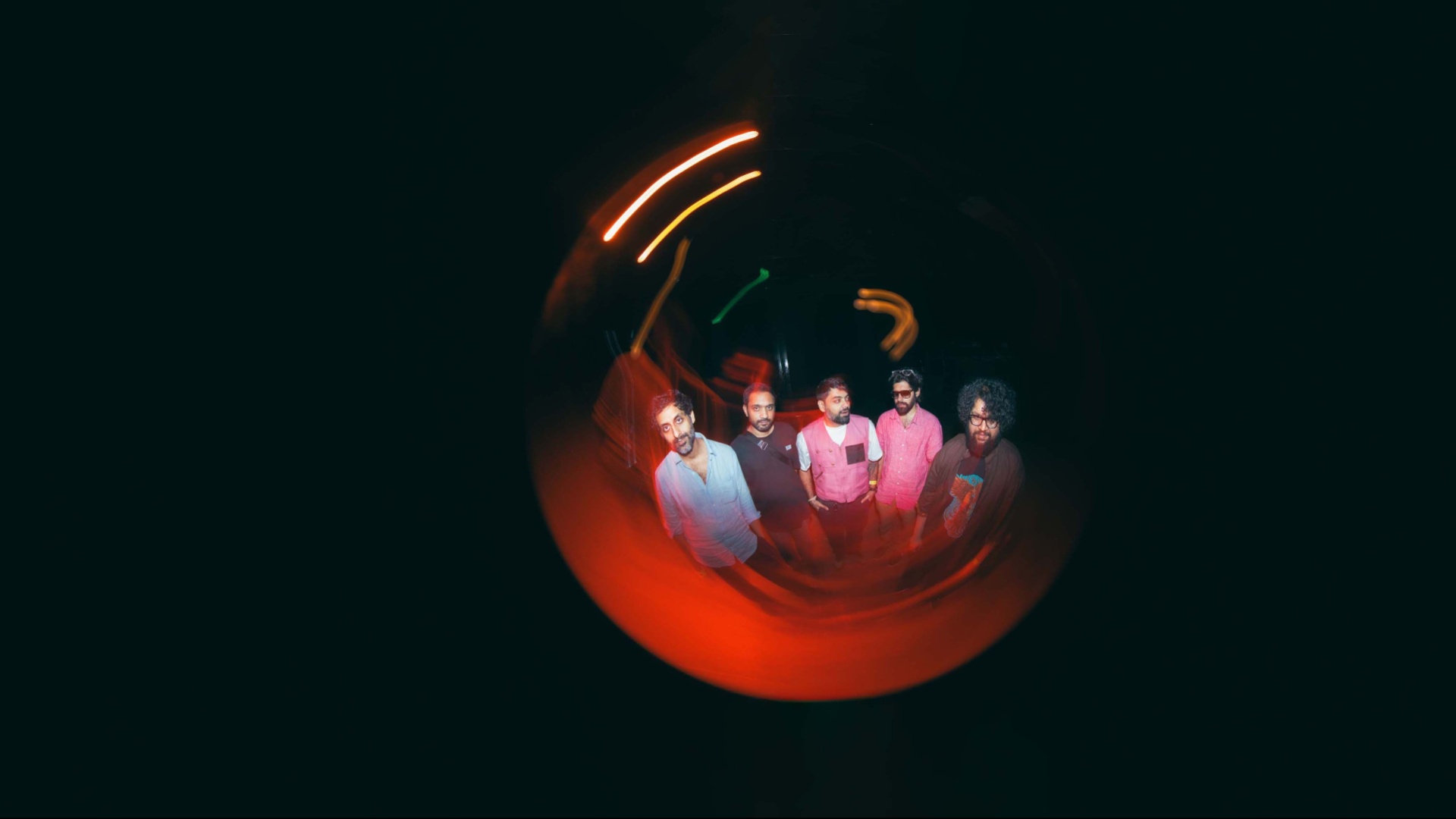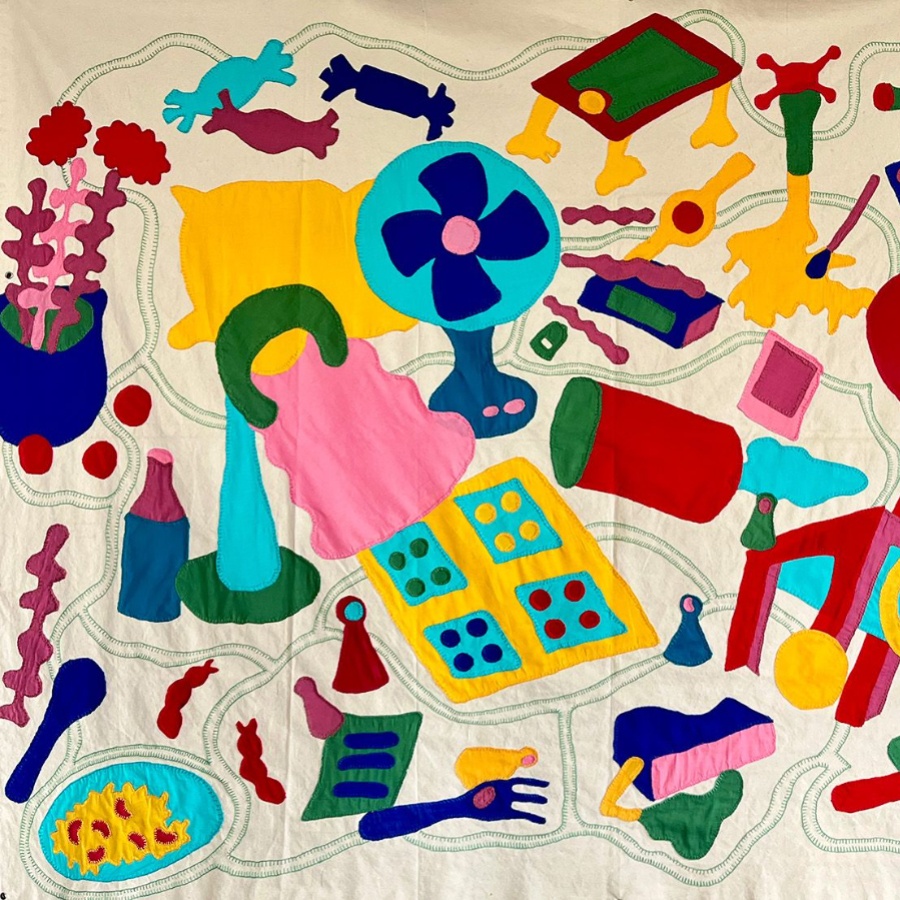In the pitch-dark silence of the Black Box room at G5A Warehouse in Mumbai, the air is thick with anticipation. Beams of white light and a familiar, upbeat bhangra riff floods the room. Spotlights hitched to the ceiling find the five members of Peter Cat Recording Co. taking their place on a small stage among a wilderness of instruments, wires, and mics. With their signature impassivity, they perform a two-minute-long, jangly, discordant orchestral intro to a thicket of camera phones swaying in front of them. It’s BETA preview night, a week before the band’s first new album in five years releases on all streaming platforms. It has been teased for the last three months, and every single person in this room, on stage and on the ground, has waited long enough.
It’s time.
Frontman Suryakant Sawhney’s tall frame bears down on the microphone. “People never change/ but I will,” he croons. The audience, by now familiar with BETA’s first single, which dropped in May, glides with his voice over every crest and trough and stops short in its tracks as Rohit Gupta swerves into a flawless, improvised saxophone solo from stage right. “Pehli baar sun rahe hain,” Sawhney half-asks, half-teases his audience, as he swigs from a black flask. “Will you play ‘Floated By’?” yells a zealous front-row fan. “No chance,” Sawhney retorts flatly.
It’s a free-to-attend, invite-only gig for the band’s most loyal fans (though some anonymous Redditors have been hawking tickets at four-digit prices). For the 200-odd people who’ve braved the Mumbai monsoon to be here tonight, it is a labour of love. Tonight, they’ll be the first in the world to listen to all the 13 tracks that make up BETA—christened thus by drummer Karan Singh’s infant son via a draw of chits. They'll also be the first in the world to witness PCRC’s live set, before the band takes off for its massive 77-date tour across the US, Europe, and India (including several sold-out shows and a few opening for Texas trio Khruangbin) commencing on August 11 at legendary nightclub Troubadour in West Hollywood, LA.
There is unanimous appreciation for the light and sound design, engineered by “in-house geniuses” Abhinav Khetrapal, Deniz Sagdic, and Prathik Sanjeev Nedungadi. There is laughter as Sawhney gives the mic over to multi-instrumentalist Kartik Pillai, who jokes about having already fucked up on the keyboards before. In a first, he sings ‘Foolmuse’, which he has written and sung for the album. And there are whoops as bassist Dhruv Bhola steps to the centre. “Ab meri baari,” he declares. “You’re so hot!” shouts a girl from the front row to scattered laughter. Bhola barely blinks before stepping gently into his yet-to-be-released track ‘I Deny Me’.

T minus 90 minutes. Bhola has a headache. Maybe it’s the bright lights, maybe it’s nerves; but right now, he sits immobile in the green room, a pair of dark sunglasses planted firmly on his nose, his palms pressing into the sides of his forehead—trying his best to block out the noise as his bandmates talk about the new album and the upcoming tour.
“BETA is about…everything,” shrugs Sawhney. “Each song has a different flavour and colour. Each is its own self-contained little movie.” There’s ‘Suddenly’, the devastating second single, released in July, which was accompanied by a little film—a home production shot in Goa—in which the boys, sporting eyeliner and nail polish, sail on a river in naval uniforms, performing a synchronised jig as Sawhney’s emotional mother looks on. While this is an ode to his late father, who was in the merchant navy and passed away when he was just a teenager, ‘People Never Change’ could be Sawhney’s own About Me page, swinging between hope and ennui—which would resonate with any urban millennial in India gingerly approaching middle age.
As ever, the songs are deeply personal, often nostalgic, occasionally flippant, frequently surprising—and always beautiful. PCRC has always been heavily experimental with instruments and samples, so a lot of the magic happens in the spaces between, before, and behind the verses. Take ‘Flowers R Blooming’: Pillai cues a double nuclear explosion to inaugurate the album, before sounds of the clarinet (Gupta), ghunghroo and hand percussions (Singh), acoustic guitar (Sawhney), and swarsangam and electric bass (Bhola) are woven into a joyous soundscape that almost masks the melancholy of Sawhney’s words. Elsewhere on the album, you’ll catch a piano, steel drums, a flute, and ektara samples, all coming together in a smooth amalgam.
Catalysed by their own personal growth (or ageing, as they see it), this melding of sounds is also a testament to their evolving musical influences, which runs the gamut from jazz to nu metal, pop and indie rock to Afro jazz, Frank Sinatra to RD Burman. The result is neither patchwork nor pastiche, but something utterly whole, a few octaves grander than the sum of its parts.
“We were actually trying to make our set-up smaller,” deadpans Gupta, and the room erupts in laughter. “We had this discussion after Bismillah—the next album has to be more compact, minimal, easy to set up. And now look, we have added 10 other things.”
T minus 45 minutes. A gangly, freckled boy lurks outside the green room as the band huddles before the preview show. He clutches a plastic packet containing a hand-painted portrait of Sawhney on paper—eyes closed, a serene expression on his face. The 20-year-old art student has followed PCRC for the last five years after he was introduced to it by his older brother’s friend. “It’s nice to be here, and it’s nice to see them finding their audience abroad,” he says, eyes darting over to the door as Sawhney steps out. “They are still pretty niche here. What can they do, Indian audiences are like that.”
In the dark days of the pandemic, as the quintet languished in their adopted home in north Goa’s Olaulim village, PCRC’s songs started trending on Spotify and Apple Music, particularly in the US, totally out of the blue. “We didn’t have a major viral moment or anything,” recalls Sawhney, “but yes, the streaming numbers began to grow. Small things started to happen. Like this major booking agency called William Morris reached out to see if we could do something together.”
It was probably a sign of their upcoming tour. “An LA-based label showed interest in us, and that also pointed us in the direction of North America,” adds Singh. Language might be a factor that helped PCRC catch the attention of listeners there; and that works for it because, as Singh says, the US remains the biggest market for the entertainment industry. “I personally suspect it’s also because everything that’s happening right now in mainstream music is largely in the same universe. And what people heard and saw in our music was slightly different, maybe because of our way of singing, songwriting, and performance.”
Now, PCRC fans from as far away as Colorado are posting on Reddit about seeking company as they trail the band across multiple cities. Others leave comments like “therapy isn’t enough i want suryakant sawhney to moan in my ears” on their YouTube channel. Still others are petitioning for PCRC to play at Coachella. Earlier this summer, Bismillah’s ‘Memory Box’ got wider play when it was licensed for the soundtrack of an episode of the Emmy-nominated comedy Hacks.

But as five fairly level-headed, middle-class blokes from Delhi-NCR who’ve been at this for a very long time, they don’t find any of this especially gratifying. “We try not to get too excited about all this stuff in the moment,” says Pillai. “But come to us a few months after the tour and ask—”
“—if we’re still together”, interjects Gupta wryly. “We’re just bad at being happy. As the music will tell you.”
“I guess we’re just not the kind of people who feel gratitude,” muses Sawhney. “It feels like there’s always something left to do.” Such as this massive upcoming tour, a marathon compared to last year’s sprint. Historically, they’ve only played a handful of gigs each year, and aren’t used to the physical demands of being on the road. Top of their minds is the need to increase stamina. “Try to exercise, try to stay sane,” says Singh, who has also chopped off his glorious mane for what he (presumably) thinks is an age-appropriate crop.
Plus Sawhney is married, Singh is a father, and recovery time in one’s thirties is not what it used to be. “We made it a point to quit our habitual smoking and drinking. Somehow we used to manage, it even used to calm the nerves,” laughs Sawhney. “But now, I’m drinking soda to fool myself into thinking I’m drinking—and it’s actually working!”
T minus 11 years (give or take). The deadly punch that PCRC has been serving at rooftop gigs in New Delhi’s Hauz Khas Village has acquired a dedicated following of its own. But these impromptu, DIY parties—an I-Day jam or a Christmas soirée orchestrated through Facebook pages—became the stuff of urban legend after a police raid interrupts a particularly overcrowded gig. Everything about the boys’ scruffy world—the address, the no-fucks-given attitude, the smirking cynicism, those early waltz-inspired songs, the memes before meme culture existed, that keen sense of irony—oozes a casual coolth and has made them very appealing to the capital’s subculture hunters.
In an interview in 2011, Sawhney prophesied the internet’s effect on the culture: “People became curious about YouTube...The whole world has become obsessed with music, maybe more than ever before...I think we’re getting to that point where Indian bands will start having signature sounds. You can listen to them, and not be like, it’s an Indian band, but be like, it’s that particular band.”
And then the tide turned.
Streaming took off, record sales nosedived, spaces shrunk, Covid hit. “After 15 years of this, you’re bound to wonder—all this time you’ve put into this, what is the end game?” Sawhney ruminates. “When do you decide that this has reached its peak?” But something has always happened that has encouraged us to continue—an unexpected call for a collaboration in 2018 when we were feeling really tired, or now, this new market in the US.”
Do they think there’s an expiry date to their careers? “No way. Look at all those old bands, they’re regrouping and touring again. It’s not like being an athlete,” says Singh. “But,” adds Sawhney, “I do think there is a golden time in your life when your mind works in a certain way, because the less you know, the more risks you’re likely to take. If you don’t take advantage of those sweet spots, you might lose a big part of your potential.”

Also, PCRC have always taken the “company” part of their name quite seriously. “We have always thought of ourselves as a business,” Sawhney explains. Other than their music, they have always focussed on merchandise, putting unusual thought in design and curation. Not surprising, the band’s DIY merch has a cult-like status among fans. For the BETA tour, there is “Zara level” merch—10,000 t-shirts, tote bags, lyric books, keychains, magnets, posters, vinyls, and more. “No musician is making money off making music—except maybe Taylor Swift.”
“Selling t-shirts is what made the last tour happen,” says the band’s manager Dhruv Singh. “Especially in America, where they stand in long queues for collectibles and memorabilia of all sorts—you can’t not take advantage of that.” Maybe it’s a business move on the band’s part to scrub the internet of all music it released before 2016. Its mythical debut album, Sinema, sits in the vault, ready to be released when, says Sawhney, they get famous. Like any entrepreneur worth his moccasins, these guys also harbour sky-high ambitions: “Bigger and richer, baby,” is the plan, according to Gupta. “The dream is to play one show a year that can pay for the rest of the year,” explains Dhruv Singh.
This last bit is clearly something they’ve been, er, brainstorming, as they rattle off a long list of dream venues: the Pyramids, the Sphere, the moon, the International Space Station (“No, seriously!”). “One special gig, to which 5,00,000 people will be invited. Production costs will be kept to a minimum. One small stage the size of G5A, lots of cameras and big screens. Everyone has a party and then leaves. And we plan our lives around that one show,” Sawhney says. “So much easier than 77 of them.”




